- Home
- David Levithan
Sam and Ilsa's Last Hurrah Page 16
Sam and Ilsa's Last Hurrah Read online
Page 16
“Sure. Of course,” Maddy says. “And I can’t wait to catch up, either. Just don’t ask me where I’m going to school. I’m sick of people asking where I’m going to school!”
“It’s a deal,” Ilsa says.
Maddy points in the direction of Czarina’s old bedroom. “I’ll be in my room if you need me. Just call when you’re ready.”
She leaves, and Ilsa and Sam are once more in their universe of two. The whole weekend, they’ve retreated into it when the social obligations have been too overwhelming.
“I wonder where she’s going to school,” Sam says.
“You’re awful,” Ilsa tells him, in the tone reserved for people who are never awful.
Ilsa hears footsteps through the ceiling, and even though she knows KK and Li are a few floors above, she likes to think it’s them, anyway. Being in KK’s apartment was the antithesis of being in this one—even though it was full of plenty of new things, it felt like it hadn’t changed at all. KK, however, had—or maybe it was just Czarina’s death that made her a little less sure of herself, and thus a little more ready to listen to others. “I thought she’d live forever,” she’d whispered to Ilsa during the funeral. “I always wanted to be just like her. Now I don’t know who to be.”
Li, sitting between KK and Ilsa, had squeezed Ilsa’s hand, there for her as always, the constant support on which a new life had been built.
And on Ilsa’s other side: Sam. After ten years of traveling and teaching and touring, he’d returned to New York. The city he had to leave, but which had never left him.
We should go to the kitchen, Ilsa thinks, at the same time that Sam says, “Let’s check out the kitchen.”
They’re still like that. Even now. Whether they go three hours or three weeks or three months between conversations, when they do talk, their thoughts and words share the same space.
The kitchen is almost exactly the same. Czarina had been so proud of it, had invested so much in it. It makes sense that there hasn’t been much room for improvement since.
Sam runs his hand over the counter, and as he does, it’s as if his eighteen-year-old self is beside him, doing the same thing. And if his eighteen-year-old self is beside him, that means that Ilsa’s eighteen-year-old self is also in the room.
Sam thinks, You leave the place you’re from. You have to. But you also need to have it stay in you for a long time. It is your center.
And then he looks at Ilsa. Ilsa, now. His other center.
“Remember that night?” he says. He doesn’t have to say which night. He still has Dolly in his pocket. She’s been his talisman.
“The night we promised,” she says. “The night we said goodbye.”
It hadn’t been their last night in the apartment—there were many other nights there, packing up, preparing Czarina for her emigration. But Sam thinks Ilsa is exactly right—the night of the party was indeed the night they said goodbye to the lives they’d had…and hello to what their lives would become.
“I have to take a picture for Parker,” Sam says. Parker had wanted to fly in for the funeral, but Gina would have killed him a thousand different ways if she’d gone into labor while he was across the country; Parker had agreed the timing was not ideal, and had stayed home to await the imminent arrival of his first daughter.
Ilsa doesn’t expect to be in the picture, but when she sees Sam is pointing the phone in her direction, she strikes a merengue pose. Sam laughs, which is wonderful to hear.
“Well done,” he says, sending the photo on its way.
There are some things about high school that Sam has completely forgotten, like #Stantastic’s tweets or Trader Joe’s Boy or anything having to do with calculus. But he remembers that night clearly. And their conversation at the end of it.
“Promise me you won’t stay here,” he’d asked.
“I promise,” she’d said. “If you promise me you’ll leave, too.”
And he’d promised as well.
That could have been it. They’d never made promises like this before. They’d asked each other things, sure. They’d made each other swear on the truth, or swear to secrecy. But not promises. Not with the stakes so high and the determination so important. They hadn’t made promises to each other because they both knew that to make the promises meant that they needed to be kept. No matter what.
Once they started, they couldn’t stop.
“Promise me you’ll tell me if you need help,” she said.
He promised.
“Promise me you’ll find things to love,” he said.
She promised, thinking of Li.
“Promise me you’ll make music,” she said.
He promised, thinking of Johan.
“Promise me that wherever you go, you’ll learn how to do your own laundry,” he said.
She promised.
This was their secret, now exposed: The things they wouldn’t do for themselves, they would do for each other. They had known this all along.
And this was, in fact, how it had worked out. Sam had seen the world, and Ilsa had seen the workings of her own heart. Sam had held his music without choking it, and Ilsa had learned a way to not only find fault, but fix some of the faults she found. They both found happiness by understanding there were going to be many times when they were not happy. They both found strength in discovering happiness could be found outside of them as well as within.
The ending, it appeared, had indeed been a beginning.
Now, another ending. Czarina gone, but the two of them still here. And this kitchen…still here.
“Remember the time…,” Ilsa begins.
The conversation that follows lasts for over four hours. Eventually Maddy comes back and joins them, and KK and Li come down and join in as well. They talk and remember, remember and talk. Even the humdrum seems magical, when seen from afar.
In their way, they bring it all back to life.
ACKNOWLEDGMENTS
Thank you to Nancy Hinkel, who is always the life of our party.
Thank you to Stephen Brown, Jenny Brown, and even people whose last names are not Brown at Random House Children’s Books. We raise a toast to you.
Thank you to Jennifer Rudolph Walsh and Alicia Gordon and everyone else we work with at WME, and to Bill Clegg and everyone at the Clegg Agency. You are all masters of seating arrangements.
Thank you to Stella Paskins and everyone at Egmont UK, to Susannah Chambers and everyone at Allen & Unwin in Australia, and to our other foreign publishers, who make the party global.
Thank you, as always, to our family and friends, with the assurance that dinner parties with you usually go better than the one depicted in this novel. Usually.
And thank you to our readers. You’re the reason we threw this party in the first place.

 The Lover's Dictionary
The Lover's Dictionary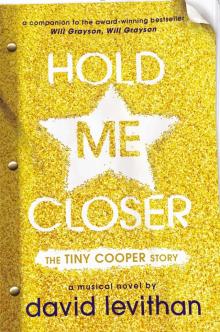 Hold Me Closer: The Tiny Cooper Story
Hold Me Closer: The Tiny Cooper Story The Full Spectrum
The Full Spectrum Two Boys Kissing
Two Boys Kissing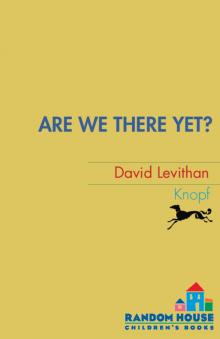 Are We There Yet?
Are We There Yet?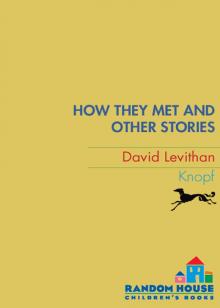 How They Met and Other Stories
How They Met and Other Stories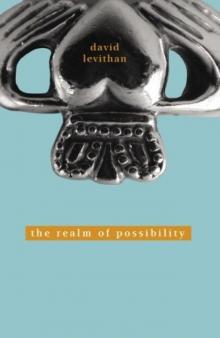 The Realm of Possibility
The Realm of Possibility Love Is the Higher Law
Love Is the Higher Law 19 Love Songs
19 Love Songs Another Day
Another Day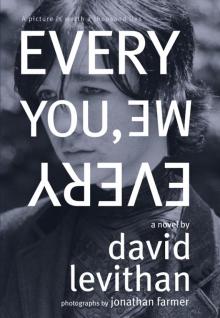 Every You, Every Me
Every You, Every Me Boy Meets Boy
Boy Meets Boy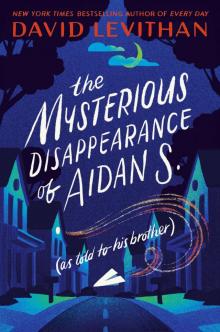 The Mysterious Disappearance of Aidan S. (as told to his brother)
The Mysterious Disappearance of Aidan S. (as told to his brother) 21 Proms
21 Proms Six Earlier Days
Six Earlier Days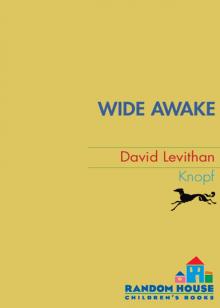 Wide Awake
Wide Awake Take Me With You When You Go
Take Me With You When You Go Someday
Someday You Know Me Well
You Know Me Well Sam and Ilsa's Last Hurrah
Sam and Ilsa's Last Hurrah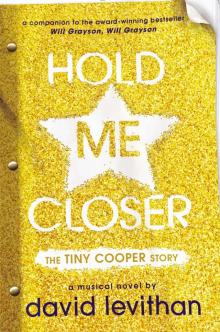 Hold Me Closer
Hold Me Closer Likely Story!
Likely Story!